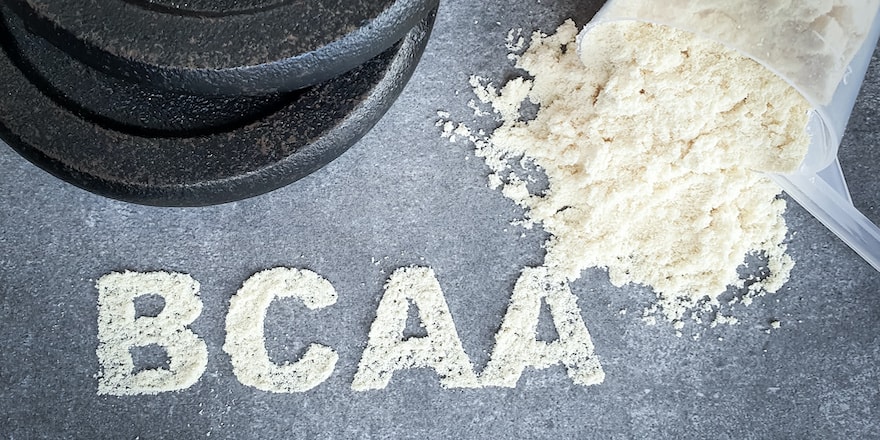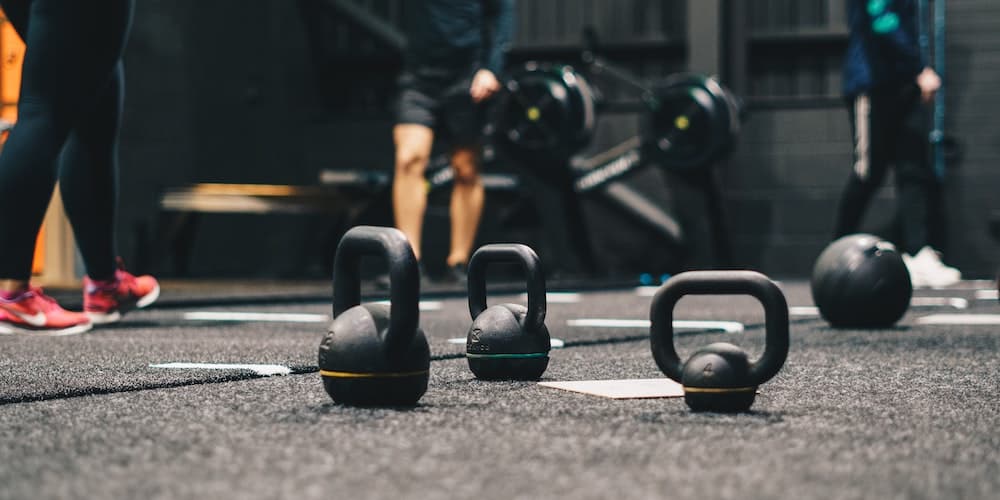Are BCAAs useful for bodybuilding?
Proteins that make up our muscle tissue
The Branched Chain Amino Acids, or branched-chain amino acids, are three small molecules:
- Isoleucine
- Leucine
- Valine
BCAAs are subunits of proteins that largely make up our muscle tissue.
Proteins are found in the diet. Eggs, meat, fish, dairy products, and legumes are our best sources of protein.
Also be aware that all protein-containing foods include these famous BCAAs, in varying amounts.
Supposed benefits
BCAAs are therefore the main subunits of our muscle proteins. One might therefore think that increasing our BCAA intake would help us build muscle mass and improve recovery. And why not increase strength, as is often claimed?
The contractions and relaxations of muscle fibers during physical exertion break down the muscle. The more intense and repeated the effort, the more the fibers are weakened and eventually destroyed. This is what is called exercise-induced muscle catabolism.
Muscle proteins release leucine, isoleucine and valine, our 3 BCAAs, during this catabolism.
Weight training causes a significant accumulation of muscle fatigue and a low-grade inflammatory syndrome. It also leads to an increase in nitrogenous waste in the bloodstream.
A BCAA regimen can then make perfect sense to reduce these phenomena. This is what has been studied by more than 50,000 researchers.
What the science says
These 3 amino acids, primarily leucine, are broken down first during physical exercise.
Based on this observation, a large number of studies have tried to show that BCAA intake around exercise could slow this breakdown. And increase performance during exercise, as well as recovery.
As this meta-analysis of randomized controlled trials published in June 2021 tells us, the sole presumed benefit of this supplement would be to reduce muscle inflammation related to resistance training such as weightlifting.
In other words: improve muscle recovery.
What European regulations say
When I try to find out if a dietary supplement is really effective, I always look at European regulation.
Why? Because this regulation closely examines all of the scientific studies conducted on a supplement. If those studies confirm a supplement’s effectiveness, then Europe validates the legitimacy of that supplement.
Currently, no claim exists regarding BCAAs. Simply because there are as many studies showing positive effects as there are studies showing no effect.
BCAAs consumed in isolation are therefore not recognized as effective for increasing muscle mass, improving recovery, or gaining strength.
Also read | How to choose the best BCAAs according to a dietitian
Does consuming BCAAs pose a danger?
Are BCAAs considered performance-enhancing drugs?
At the moment, WADA, the World Anti-Doping Agency, does not consider BCAAs to be a doping substance. They can therefore be used in competitions and high-level sports.
Are BCAAs harmful to health?
No study to date has shown any adverse effects from BCAA consumption in healthy individuals.
However, if you have health issues and especially kidney failure, I advise you to consult your primary care physician. BCAAs are also not recommended for children, adolescents, and pregnant and breastfeeding women.

So, BCAAs or proteins?
Proteins versus BCAAs
Proteins are truly effective for the development and maintenance of muscle mass. All studies are conclusive and European regulations have long validated the beneficial effects of proteins on increasing muscle mass and strength.
Moreover, dietary proteins all contain BCAAs. So the answer is very simple: favor proteins rather than ‘isolated’ BCAAs to reach your goals.
What are the recommended dosages?
First, you should know that the body cannot produce BCAAs. Leucine, isoleucine and valine are among the eight amino acids considered ‘essential’. These must be supplied by the diet.
This comprehensive scientific study published in 2019 shows that proteins have very beneficial effects for athletes.
So it is your protein intake that you should monitor, not your BCAA intake:
- Protein recommendations for athletes are 1.4 g (endurance) to 1.8 g (strength) of protein per kg per day.
- Protein recommendations for a non-athlete are 1 g of protein per kg per day.
In summary, for a 75 kg strength-training athlete seeking to develop muscle mass, an intake of 135 g per day is ideal.
How to find quality BCAAs?
Early BCAAs of questionable quality
This dietary supplement has a controversial history, because the first BCAAs on the market came from animal-derived by-products : feathers, animal skin, hair…. And this is often still the case.
And the quality of the BCAAs currently available is not yet optimal. Also know that BCAAs are provided in sufficient quantities if your diet is high-protein.
Indeed, protein-rich foods (eggs, meat, fish, dairy products…) all contain BCAAs in large amounts. This more than covers your needs for the purpose of muscle growth.
Be wary of marketing
When you compare the different BCAA options, you’ll see that each brand’s sales arguments are different. And for good reason, since there is no scientific evidence of their effectiveness nor a nutrition claim validated by Europe, each brand uses its own wording to make them appealing.
Some will tell you they help build muscle mass, others that they help you lean out, increase your muscle strength, or reduce your fatigue… I’ll grant you that it’s hard to have a unanimous message when there’s nothing specific to say.
An absurd distinction
Are you more 2:1:1 or 8:1:1? With or without flavor? Tablets or powder? Brands, not short on imagination, try to diversify the BCAA offering to make them increasingly attractive.
BCAAs of unknown origin, Vegan BCAAs… This supplement, which has never shown any effectiveness, is nevertheless a leader among dietary supplements consumed in gyms.
Unfortunately, the consumer, often young, is left in the dark when it comes to whether or not to use BCAAs.
BCAAs are simply very profitable. Selling a product for between €70 and €200 per kilogram that costs less than €10 per kilogram to produce is bound to be very attractive…
You won’t find these figures online and I share them with you in full transparency so that you know what to expect!

What are the best sources of BCAAs?
Whey, an important source of BCAAs
If you’d like to supplement your diet with BCAAs, note that 30 g of native whey isolate, the best quality whey that I recommend in this article, already provides 7.5 g of BCAAs. These BCAAs are of good quality because they come from fresh milk and not from the waste of the cheese industry.
Two shakes will give you an extra 15 g of BCAAs per day. That’s the intake recommended by the few scientific studies that discuss the benefits of BCAAs for reducing muscle inflammation in the context of resistance training.
Also read | Best whey: 10 brands tested by a dietitian-nutritionist
I’m vegetarian, what should I do?
If you follow a vegetarian diet, simply opt for plant proteins which will also provide their amounts of BCAAs. But it can be very difficult to meet your protein needs on a vegetarian diet.
Legumes, although relatively rich in protein, have lower CUD (digestive utilization coefficient) and IC (protein chemical indices) than animal proteins.
However, plant protein powders have very high assimilation rates and chemical indices. This makes them digestible and very effective for supplementing dietary protein.
Also read | How to choose plant protein powders according to a pharmacist
Animal proteins versus plant proteins
Finally note that the assimilation and utilization of milk proteins by our bodies is still better compared to plant proteins (soy, pea and other plant proteins).
For the simple reason that animal-derived proteins more closely resemble the proteins that make up the human body.
If you don’t follow a particular diet, opt instead for a low-lactose milk protein such as native whey isolate. It will be easier to digest.
My final advice
💡 Should you consume BCAAs during weight training?
Yes, but I strongly advise you to invest in a native whey isolate, which you can easily find for around €30 per kilogram, and which will be much more effective than isolated BCAAs at achieving your goals.
💡 It is during rest that muscle mass is gained
If your goal is to develop your muscles, don’t forget that your training is just as important as your recovery for optimal muscle anabolism. Indeed, it is at rest that the muscle regenerates and grows. I therefore recommend at least 2 days of rest per week.



